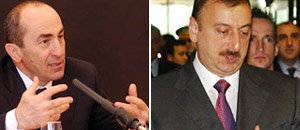The Karabagh peace settlement negotiations are becoming more and more uninteresting. They are uninteresting just like watching a soccer game when you already know the score, or when you watch a film knowing the plot beforehand. You don’t have to get surprised, or angry, doubt or think twice because, according to many Armenian, Russian, Azerbaijani and other specialists, the two negotiators talk about everything but the peace settlement.
In order for you to not get the impression that the two sides are not going to talk about the peace settlement in some European country or elsewhere, some meeting/seminars and press conferences are held in each country. The “spirit” of the Akif Naghis and Armen Avetisyans out there keep that impression instilled in your mind, although the presidents of both countries sustaim those two.
In order to find out what the leaders of each side talk about, we must first try to understand what a peace settlement of a conflict really means. I think that this is a process during which both sides present their point of views of solving the problem peacefully. I repeat sides, and not negotiating groups that try to formally turn theories that they have made up into reality and instill that in the minds of humanitarian group members.
These “formal” negotiations remind you of the Armenian tradition of seeing the bride before marriage. The parents, along with the relatives, find a bride for their son who wants to get married. They know beforehand that the “groom” will find something to pick on-the bride’s nose is too big, her legs are too thin, she has green eyes, etc. As the groom’s parents don’t get tired of bringing new brides, the negotiators also don’t get tired of presenting new package deals, taking the peace settlement step by step, or organizing a referendum, etc.
Just like the parents and relatives don’t want to find out whether or not the bride wants to get maried with their son, the sides also don’t want to ask the people’s opinion before making a decision. The presidents just write schemes on the chalkboard: Ilham Aliev suggests taking Akif, while Robert Kocharyan says there is someone who goes by the name of Zhirair, but they both say that those two men will not like the schemes.
So, while the two negotiators are trying to find new schemes, the two presidents are discussing the upcoming elections, chances of maintaining the authroities, methods, etc.
The negotiators know very well that this is a difficult period. The negotiatiors also know that one side will reject any offer made by the other side. Each president will return to his country, and while one will talk about enfolding the country’s military budget, the other will try and see which country is the most armed in the region.
Before leading peace negotiations, the people of each country had to be ready for the meeting of the two presidents and discuss the idea of a peace settlement. Before the meeting, the presidents of both countries had to make a speech to the people, claiming that there is no alternative to peace. The mass media had to talk about the roads to take leading towards peace; people had to ask the presidents how peace was going to established. We Armenians don’t care about all this. We don’t care if the president of Armenia meets with King of Sweden Carl Gustav or the president of our neighboring country Azerbaijan. The people have no expectiations for the meeting with Carl Gustav or Alive in Rumbaye.
When I say they had to make a speech, I don’t mean right before the negotiations. I think that both presidents had to start talking about speech right after the war ended. I can only remember three times that there have been speeches made about establishing peace ever since the war ended back in 1994: Levon Ter-Petrosyan’s interview with journalists back in 1997, the article entitled “War or Peace-Time to get serious” and the resignation speech made by the first president of Armenia. At the time, the former president was warning the people that the “war party” is coming to power.
Ter-Petrosyan had the right to say that. After all, in his article “War or Peace-Time to get serious”, he had stated that ceasefire doesn’t mean that the war is over and that it will be much harder to lead peace negotiations than war.
With this in mind, the situation in Azerbaijan is not looking so good. On one hand we have our former president, who made serious judgements concerning the peace settlement; on the other hand, we have Azerbaijan who doesn’t even pay attention to its people when they talk about peace.
“The war between Azerbaijan and Armenia is just stupid. Certain compromises must be made in order to establish peace. I don’t expect anything from the authorities when it comes to making compromises. It’s clear that Ilham Aliev really wants to resolve the Karabagh conflict. The people of Armenia and Azerbaijan must take part in the negotiations. There are smart, real patriotic people both in Armenia and Azerbaijan who realize that there is no outlook for delaying the negotiations. Years pass by, ceasefires are declared; there must be a way to come to terms with Armenia,” says Azeri politician Zardusht Alizade who is not allowed to speak publicly on television networks in Baku. Society reads about his opinions on this issue in Azeri newspapers and the copies of this newspaper don’t exceed the ten thousand mar, just like Armenia’s newspapers.

